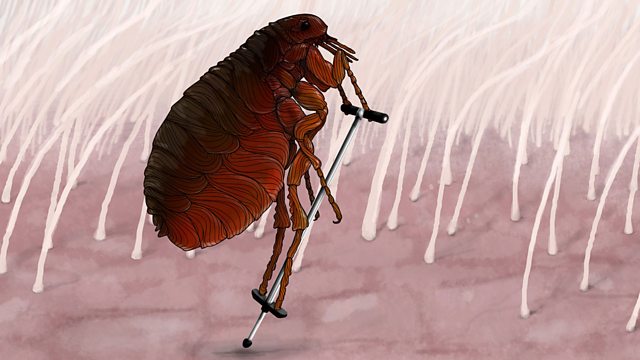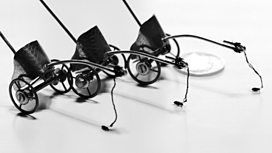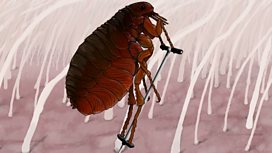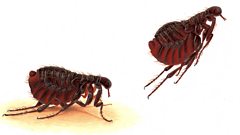Fleas
Brett Westwood learns how fleas are entwined with disease, love, language and humour.
Throughout history, human fleas have been one of our closest companions; the irritating bedfellows of everyone from kings and queens to the poorest in society. Brett Westwood discovers how the flea has been a carrier of disease, causing suffering on an enormous scale. But, despite being a danger and a pest, their proximity has led to us to try to understand them and find humour in them.
The esteemed British naturalist Dame Miriam Rothschild was one of the world's leading experts on fleas and led an investigation into how they propel themselves to such speed and distance from their minuscule frame. As parasites, their ability to jump onto hosts to suck their blood led to fleas being charged with sexual energy in the 16th century. Poets wrote entertainingly intimate poems of their jealousy that the flea could jump onto areas of a beautiful woman that they themselves would be unable to reach.
The comedic role of the flea continued into the era of the flea circus when they pulled miniature metal chariots several times their weight and their role as performers didn't end there - leading on into early cinema and even tourism. They may have been often overlooked but fleas have had a stark impact on our lives.
Revised and shortened repeat.
Archive Producer: Andrew Dawes for ���Ͽ�����¼ Audio in Bristol
Last on
![]()
How human fleas, pulling miniature machinery, became an international phenomenon.
![]()
The World According to Flea
COMEDY: Welcome to Boutique Bubos, a bijou plague service run by an industrious flea.
Clips
-
![]()
The World According to Flea
Duration: 01:48
-
![]()
How and why fleas jump so high
Duration: 02:59
Theresa Howard
Her particular collections and research interests are Siphonaptera, (fleas) and Culicidae (mosquitoes) and she has published widely on these topics. As a core member of the Collections Committee she is responsible for the overarching planning of the maintenance and development of the Natural History Museums Collections.
Professor Judith Buchanan

Through the creative work of Silents Now, she seeks to make silent films more than just documents of historical interest, but a source of pleasurable engagement for contemporary audiences also, thereby helping to ensure the preservation and ongoing life of a valuable but threatened part of our film heritage.
She is the author of, among other things, Shakespeare on Film and Shakespeare on Silent Film: An Excellent Dumb Discourse and she is editor of The Writer on Film: Screening Literary Authorship.
Twitter:
Dr Tim Cockerill

He is also a seasoned performer specialising in obscure and often dangerous circus and sideshow stunts.
Dr Kelvin Corlett

Specialising in scientific vocabulary, he is part of the editorial team currently working on the ongoing project to completely revise the OED.
Cheryl Whitehorn

She has worked on mosquito control with the on the Cayman Islands and in Brazil and now teaches students at LSHTM the fundamentals of distinguishing one insect vector from another.
She contracted malaria whilst working on a malaria control programme in East Timor. The irony was not lost on her. She said in her defence that she was taking anti-malarial tablets but parasites don’t always read the labels.
Broadcasts
- Tue 10 Nov 2015 11:00���Ͽ�����¼ Radio 4
- Mon 16 Nov 2015 21:00���Ͽ�����¼ Radio 4
- Sun 6 Dec 2020 06:35���Ͽ�����¼ Radio 4






